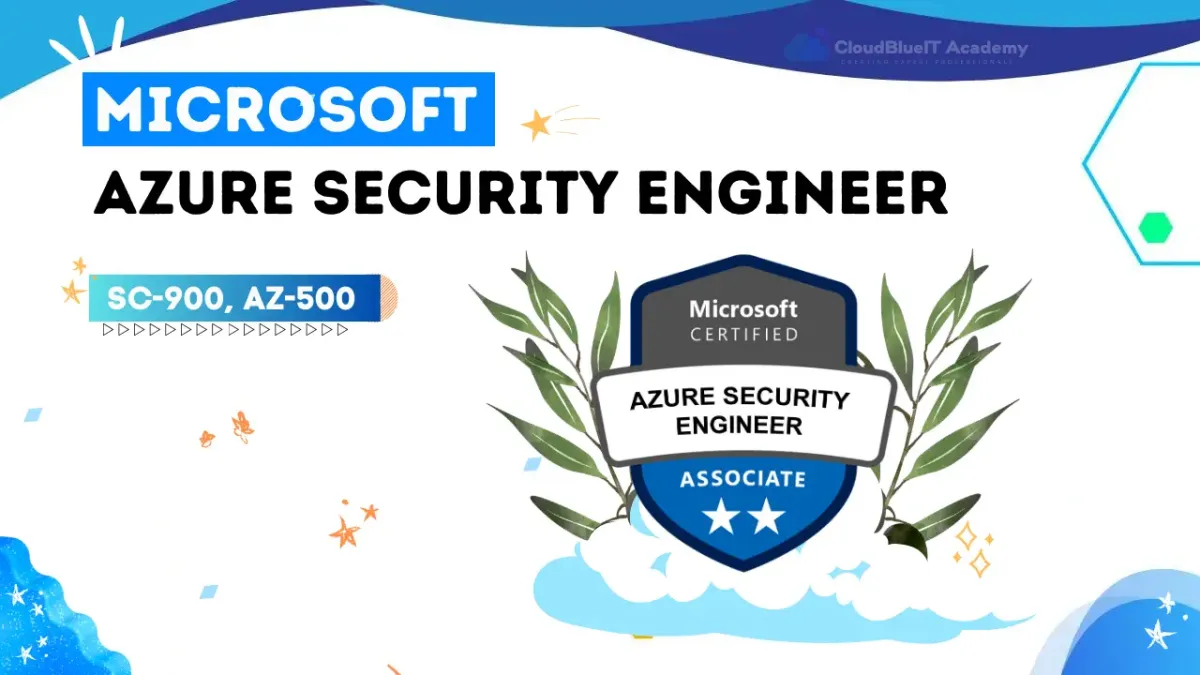Azure Security Engineer SC-900, AZ-500

About Course
In today’s digital landscape, ensuring the security of cloud environments is of paramount importance. With the increasing adoption of cloud computing, organizations are seeking skilled professionals who can safeguard their cloud infrastructure. This is where Azure Security Engineers with SC-900 and AZ-500 certifications come into play. In this article, we will explore the role and responsibilities of an Azure Security Engineer (SC-900, AZ-500), the skills required, and the steps to become one.
-
The Role of an Azure Security Engineer (SC-900, AZ-500)
- As an Azure Security Engineer (SC-900, AZ-500), your role encompasses a wide range of responsibilities. Let’s delve into some key aspects
Designing and Implementing Security Controls
As an Azure Security Engineer, you play a crucial role in designing and implementing security controls to protect Azure resources. This involves configuring secure access, network security groups, virtual network peering, and more. By following industry best practices, you ensure that the cloud environment remains resilient to potential threats.
Managing Identity and Access
Identity and access management is a critical aspect of cloud security. As an Azure Security Engineer (SC-900, AZ-500), you are responsible for managing user identities, access policies, and authentication mechanisms. This includes implementing multi-factor authentication, role-based access control, and privileged identity management to prevent unauthorized access.
Monitoring and Threat Detection
Continuous monitoring and threat detection are vital for maintaining a secure cloud environment. Azure Security Engineers employ various tools and techniques to detect and respond to potential security incidents. By analyzing logs, monitoring network traffic, and utilizing Azure Security Center, they proactively identify vulnerabilities and mitigate risks.
Security Compliance and Governance
Ensuring compliance with regulatory standards and internal policies is a fundamental aspect of cloud security. Azure Security Engineers (SC-900, AZ-500) have expertise in configuring and managing compliance frameworks within Azure. They work closely with compliance teams to implement controls, conduct audits, and generate compliance reports.
Topics Covered :
Microsoft 365 Security and Compliance solutions.
Learn configurations to protect identity & access, data, applications, and networks.
Managing the security posture, identifying and remediating vulnerabilities, performing threat modelling, and implementing threat protection.
Microsoft Security solutions
Microsoft compliance solutions
Manage identity and access
Secure networking
Secure compute, storage, and databases
Manage security operations
Frequently Asked Questions
What certifications are required to become an Azure Security Engineer (SC-900, AZ-500)?
To become an Azure Security Engineer (SC-900, AZ-500), you need to acquire the SC-900: Microsoft Security, Compliance, and Identity Fundamentals certification and the AZ-500: Microsoft Azure Security Technologies certification.
Can I pursue the Azure Security Engineer (SC-900, AZ-500) role without prior experience?
While prior experience in the field of cloud security is beneficial, it is not always a strict requirement. With the right combination of certifications, skills, and a strong understanding of Azure services, you can pursue a career as an Azure Security Engineer (SC-900, AZ-500).
How does Azure Security Center contribute to the role of an Azure Security Engineer (SC-900, AZ-500)?
Azure Security Center is a powerful tool that provides unified security management and advanced threat protection for Azure environments. As an Azure Security Engineer (SC-900, AZ-500), you can leverage Azure Security Center to monitor security posture, detect vulnerabilities, and respond to threats effectively.
What are the benefits of becoming an Azure Security Engineer (SC-900, AZ-500)?
Becoming an Azure Security Engineer (SC-900, AZ-500) offers numerous benefits. Firstly, it opens up exciting career opportunities in the rapidly growing field of cloud security. Additionally, it allows you to contribute to securing cloud-based systems, protecting sensitive data, and mitigating cyber threats.
How can I keep up with the latest trends and developments in Azure security?
To stay updated with the latest trends and developments in Azure security, it is essential to engage in continuous learning. Microsoft provides various resources, including documentation, online courses, and webinars, to help professionals stay abreast of the latest Azure security practices.
Course By

Narayana B S L
Target Audience
Audience : Beginner to Intermediate
Course Benefits
- Duration : 4 Weeks
- Hands-on Labs
- Course Materials : Provided
- Recording Videos : Provided
- Course Completion Certificate : provided
- Post course completion support : Provided
...
….

